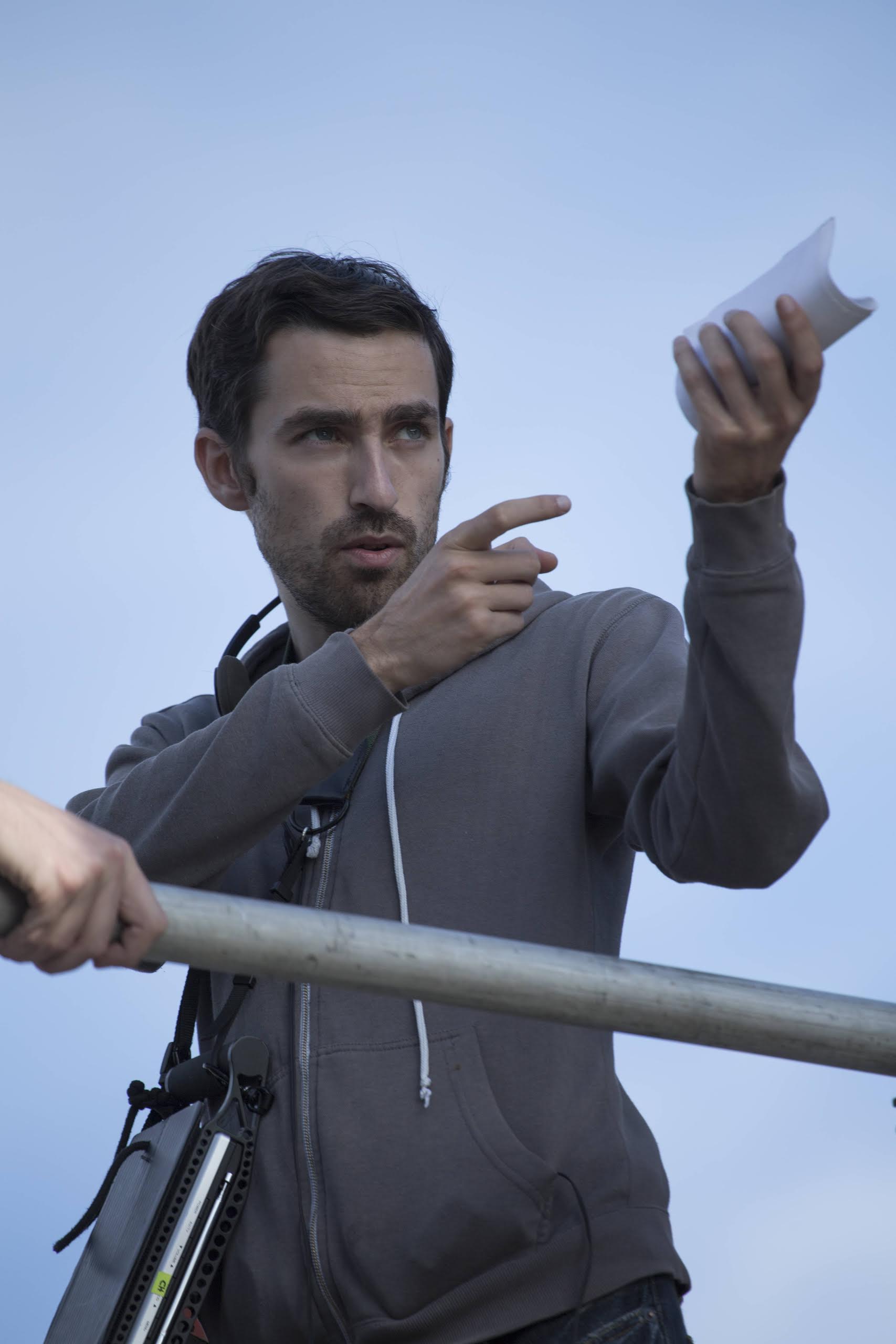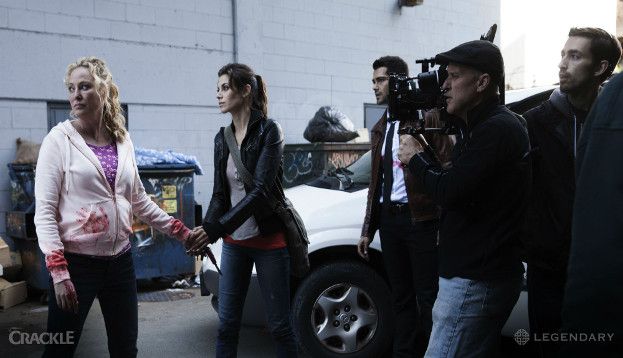Hollywood director Zach Lipovsky (Leprechaun: Origins) got his first big break on Steven Spielberg and Mark Burnett’s reality TV show, On the Set. More recently, he helmed WWE Films’ Leprechaun: Origins. Now he hopes he’s laid the groundwork for a new linear franchise based on Capcom’s Dead Rising zombie games. Dead Rising: Watchtower will debut on Sony’s Crackle.com on March 27. The feature film is the first offering from Legendary Pictures’ Legendary Digital Media division. Lipovsky explains why digital is the perfect platform for turning video games into linear entertainment in this exclusive interview.
 Director, Zach Lipovsky
Director, Zach Lipovsky
Do you see room for a sequel to Dead Rising: Watchtower?
Legendary is known for doing big feature films, but this is the first project through their digital and television division. The idea for this would be to see if there’s an audience for it. If everyone really likes it then it could become a longer form television property, rather than just feature films. It’d be cool even if it’s something like a 10-part True Detective-style show, but with combo weapons and killing zombies. Then there’s the longer-form narratives that are really taking off online and binge watching could work really well with Dead Rising because each season could be a different city or a different outbreak. They could really explore all these different chunks of the story in the same way that the games do, which would be very cool.
Were you thinking about this bigger landscape as collaborating on this original story?
Definitely, because we’re already coming into the franchise world, so the structure of having something that is a story that’s part of a much bigger world is already there because that’s what they’ve been doing with the games. All the way through developing the story that was in our minds. We didn’t let that get ahead of ourselves. We still just think about making this as best as we can, but the ambition of everyone involved was that there’s much more of the story to tell.
We’ve seen the Mortal Kombat TV series back in the day. Do you think that the serialized medium is better for video games than feature film?
The Mortal Kombat Legacy series did really well, and that was one of the first high-quality long-form online web series that took the game universe and really brought it to life and did really well. They got almost 100 million views out of it and that form fits the video game world a lot better because you’re online and you can go right to the audience that’s already consuming it. That means that you can make it exactly for them, rather than trying to do a much broader thing which has to be watered down. And because you’re online there are less restrictions and you can be true to the material. That’s really what the fan base wants.
How are you offering the game online?
People consume content really differently online. Some people want to watch a really long-form thing, while others want to watch something cut up into little bits. We’ve structured this as a feature length film, but it can also be consumed in smaller ten minute chunks. We’ve designed it so it works either way narratively. At this point, you have to let the audience choose how they want to watch it rather than making that choice for them.
Did you look at the success of Halo: Nightfall and Mortal Kombat Legacy for the smaller installments?
Yeah, it’s a lot more flexible and it just takes a little bit more work when you’re writing the story to make sure that it’s still digestible as a whole piece and individually, but we came up with a really cool dynamic that works really well so that it can be consumed either way.
From The Walking Dead and iZombie to Z Nation, why are zombies so popular on TV and everywhere?
Making this film I discovered that basically every person on the planet wants to be a zombie. As soon as I started making this film, every person I know wanted to come on set and be a zombie extra. There’s something about the fact that they are very close to being human that people love. They’re basically a person, but they’re not. And the fact that they’re so close to who we are somehow connects with the audience in a really strong way, whether they’re fast zombies or slow zombies.
If Watchtower works digitally, what opportunities do you see for other game publishers online?
The obstacle with game companies is more about showing them that we can make stuff that’s really good. In the past, a lot of the video game content has not been exceptional and it’s ruined the brand. Meanwhile, the game industry is making ten times as much money making as the film industry so they don’t have a lot of incentive to hand over their properties to the film industry. The first step is just showing them that people who love games and get the properties can make stuff that’s really good, and then they’re going to start opening up the properties that they have. Otherwise, there’s no incentive for them.
“Meanwhile, the game industry is making ten times as much money making as the film industry so they don’t have a lot of incentive to hand over their properties to the film industry.”
Did you take into consideration at all the viewers who haven’t played the games?
Yeah, we tested the film as we were editing it with both people who really knew the world and people who didn’t know it at all. The film basically explains some of the newer content like Zombrex and that in this world outbreaks have been going on for a long time and everyone knows what zombies are. It runs through what protocols are followed when there’s an outbreak and the rules of Dead Rising.
If Dead Rising becomes a 10-episode series, do you think there could be some type of video game tie-in?
That would be ideal and there have been some attempts in the past. It’s just the complications of trying to coordinate the people in the film world and the people in the game world. Getting all the ducks in the row to make the film is incredibly challenging and not necessarily that easy to time exactly when it’s going to happen, especially when you’re trying to sync it with a huge game franchise that’s being built at the same time.
When you talk to Hollywood executives do they view video games as an art form today?
Yeah, it’s still emerging. A few years ago it was all about getting every comic book on the planet and before that it was getting every 80s TV show. I think people would love to get their hands on some of the bigger video games, but a lot of them aren’t available. The video game world doesn’t really need the film industry. They are doing just fine on their own. It’s up to the film industry to prove themselves to the video game industry, whereas the film industry is used to just walking in and having everyone fall over themselves to hand over a property.
“The video game world doesn’t really need the film industry. They are doing just fine on their own. It’s up to the film industry to prove themselves to the video game industry, whereas the film industry is used to just walking in and having everyone fall over themselves to hand over a property.”
Hollywood made a lot of bad comic book movies in the 80s and 90s before Marvel and DC got things right. Do you think all the bad video game movies we’ve seen will pave the way for good video game movies in the future?
Yes, the people who were making the bad comic book movies didn’t grow up with comic books. They were just film executives that were trying to make a quick buck. But now we are seeing all the people running Marvel grew up with Marvel. They grew up with that content and want to bring it to life as they were thinking about everything they loved about it when they were a kid. That’s now what you’re seeing in the video game world, people who grew up with video games are now in power in Hollywood so hopefully you’ll see the same kind of shift in quality.

